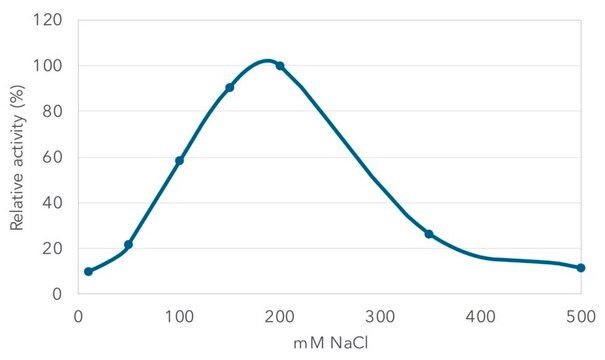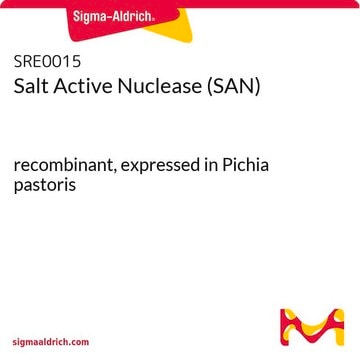SRE0115
Salt Active Nuclease (SAN)
Heat-labile, recombinant, expressed in Pichia pastoris, Triton-free
Synonym(s):
Heat-labile salt active nuclease, endonuclease, salt active endonuclease, salt tolerant nuclease
About This Item
Recommended Products
recombinant
expressed in Pichia pastoris
Quality Level
specific activity
≥175 000 U/mg
feature
Heat-labile
composition
Triton-free
packaging
pkg of 25 kU
shipped in
dry ice
storage temp.
−20°C
Looking for similar products? Visit Product Comparison Guide
General description
This Salt Active Nuclease (SAN) is a nonspecific endonuclease recombinantly produced in Pichia pastoris, with optimum activity at high salt concentrations. It is active in a variety of buffers and can be easily inactivated by treatment with a reducing agent. These features make it particularly useful in the purification of proteins and removal of DNA and RNA from molecular biology reagents. It can be used on cell lysates for viscosity removal, and additionally at the elution step of purification, where there are smaller volumes and a purer protein - allowing for effective and efficient DNA removal.
Application
Features and Benefits
- Active at up to 1M NaCl
Tolerates imidazole and can be separated from most proteins by cation exchange or inactivated by reducing agents.
Unit Definition
Reconstitution
Other Notes
Salt concentration (NaCI / KCI): 150 - 900 mM, optimal: 400 - 650 mM
Mg2+: >1 mM is required for activity, optimal: 5 - 50 mM
pH: 7.3 – 10, optimal: 8.2 - 9.2
Not recommended to use in presence of SDS or urea.
Storage Class Code
10 - Combustible liquids
WGK
WGK 2
Flash Point(F)
Not applicable
Flash Point(C)
Not applicable
Choose from one of the most recent versions:
Certificates of Analysis (COA)
Don't see the Right Version?
If you require a particular version, you can look up a specific certificate by the Lot or Batch number.
Already Own This Product?
Find documentation for the products that you have recently purchased in the Document Library.
Our team of scientists has experience in all areas of research including Life Science, Material Science, Chemical Synthesis, Chromatography, Analytical and many others.
Contact Technical Service







